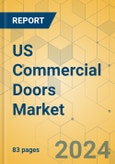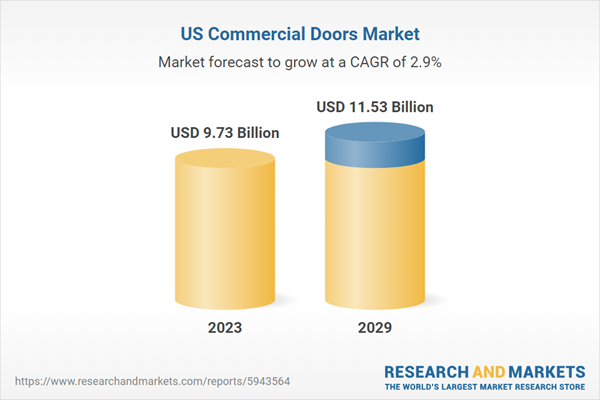Speak directly to the analyst to clarify any post sales queries you may have.
MARKET ENVIRONMENT
Market players in the US commercial doors sector are adapting to changing market dynamics by implementing various strategies. These include prioritizing research and development to stay abreast of technological innovations ensuring that their product portfolios align with the demand for automatic, sustainable, and technologically enhanced doors. Moreover, strategic partnerships and collaborations are common strategies to integrate new technologies seamlessly and expand market reach. Sustainability in manufacturing processes is another key focus area, with market players aiming to meet consumer demand for eco-friendly products while demonstrating corporate responsibility. Advancements in door manufacturing technologies, such as precision engineering and digital integration, drive product improvements, enhance overall performance and durability, and ensure market competitiveness. The rise of coworking spaces and high-tech infrastructure has led to increased demand for flexible and technologically advanced commercial doors, prompting market players to innovate and cater to the evolving needs of modern workplaces.U.S. COMMERCIAL DOORS MARKET SEGMENTATION
Material Insights:
- Wooden Doors: Wooden doors maintain their popularity due to their timeless aesthetic appeal and natural insulation properties. Hotels, upscale boutiques, and heritage buildings favor them.
- Metal Doors: Metal doors, constructed from steel or aluminum, are synonymous with robustness and enhanced security, making them prevalent in banks, government buildings, and high-security commercial establishments.
- Plastic Doors: Plastic doors, often made from PVC or composite materials, offer a cost-effective solution for businesses, particularly those on a budget. Their resistance to moisture makes them suitable for various applications, such as restaurants and healthcare facilities.
- Glass Doors: Glass doors contribute to modern architectural styles, providing a sleek and contemporary look favored by many US commercial spaces. Advanced glass technologies, such as low-emissivity coatings, enhance energy efficiency, making them an attractive option for environmentally conscious businesses.
- Fiberglass Doors: Fiberglass doors are renowned for their exceptional resistance to adverse weather conditions, making them a dependable choice for exterior entrances. Their lightweight nature and excellent strength-to-weight ratio simplify installation and ensure durability, particularly in regions with challenging weather.
Type:
- Hinged Doors: Hinged doors, also known as swing doors, offer a classic design but require adequate floor space for the swing radius. They are commonly found in boutique shops, restaurants, and offices.
- Sliding Doors: Sliding doors are ideal for locations with limited floor space, as they do not require a swing radius. They provide seamless transitions between indoor and outdoor spaces and are frequently used in shopping malls, airports, and healthcare facilities.
- Revolving Doors: Revolving doors efficiently manage foot traffic and enhance energy conservation by minimizing the exchange of interior and exterior air. They are commonly found in hotels, airports, and large office buildings.
Installation:
- New Construction: In new construction projects, architects and designers can select commercial doors that align with the overall design and functionality of the building. Customization options allow businesses to achieve design cohesion and make a strong visual impression on visitors.
- Replacement: Replacement commercial doors are often chosen to upgrade existing structures and stay competitive. Careful planning is required to minimize disruption to daily operations during the replacement process.
Operations:
- Manual Doors: Manual doors remain a versatile and cost-effective choice for many businesses, offering straightforward operation and minimal maintenance requirements. They are commonly found in small retail shops, industrial warehouses, and office buildings.
- Automatic Doors: Automatic doors provide convenience and accessibility, particularly in high-traffic areas such as shopping centers, airports, and healthcare facilities. They contribute to energy efficiency and security, making them an attractive option for businesses that enhance customer experiences.
End User:
- Corporate Offices: Corporate offices prioritize security and sustainability, often incorporating advanced access control systems and energy-efficient materials into their commercial doors.
- Hospitality Businesses: Hospitality businesses create welcoming entrances to make a positive first impression on guests. Energy-efficient doors with thermal insulation are essential for maintaining comfortable interior environments.
- Retail Stores: Retail stores prioritize attractive storefronts and efficient traffic management to enhance customer satisfaction. Automatic doors with motion sensors help optimize energy use and ensure smooth customer flow.
- Educational Institutions: Educational institutions prioritize safety and accessibility.
COMPETITIVE LANDSCAPE
The US commercial doors market is witnessing intensified competition among global and domestic players, offering diverse product ranges.Major players such as Andersen Corporation, Cornerstone Building Brands, JELD-WEN, and Pella Corporation dominate the market.
Strategic agreements, acquisitions, and collaborations are common strategies employed by market players to gain access to commercially launched products and enter new market segments.
SEGMENTATION & FORECAST
MATERIAL (Revenue)
- Wood
- Metal
- Plastic
- Glass
- Fiberglass
TYPE (Revenue)
- Hinged
- Sliding
- Revolving
INSTALLATION (Revenue)
- New Construction
- Replacement
OPERATION (Revenue)
- Manual
- Automatic
END-USER (Revenue)
- Corporate Offices
- Hospitality
- Retail Spaces
- Educational Institutes
- Industrial
- Healthcare
- Others
MARKET STRUCTURE
- Market Dynamics
- Competitive Landscape of the US Commercial Doors Market
- Key Vendors
- Other Prominent Vendors
APPENDIX
- Research Methodology
- Abbreviations
LIST OF VENDORS
Key Vendors
- Andersen Corporation
- Cornerstone Building Brands
- JELD-WEN
- Pella Corporation
- Masonite
Other Prominent Vendors
- PGT Innovations
- ASSA ABLOY
- Marvin
- Overly Door Company
- VT Industries
- Graham Architectural Products
- Eliason Corporation
- AMBICO
- Special-Lite
- Horner Millwork
- Stanley Access Technologies
- Overhead Door Corporation
- Horton Automatics
- C.R. Laurence
- ManhattanDoor
- Best View Garage Doors
- Mesker Door
- Rytec Corporation
- Chase Doors
- R&S Erection of Tri-County
- Clopay Corporation
- Boon Edam
- South Jersey Glass & Door
- Allegion
- Dortek
KEY QUESTIONS ANSWERED
1. What factors are driving the growth of the US commercial doors market?2. What materials are commonly used in commercial doors in the US?
3. What types of commercial doors are available in the market?
4. Who are the major players dominating the US commercial doors market?
Table of Contents
Companies Mentioned
- Andersen Corporation
- Cornerstone Building Brands
- JELD-WEN
- Pella Corporation
- Masonite
- PGT Innovations
- ASSA ABLOY
- Marvin
- Overly Door Company
- VT Industries
- Graham Architectural Products
- Eliason Corporation
- AMBICO
- Special-Lite
- Horner Millwork
- Stanley Access Technologies
- Overhead Door Corporation
- Horton Automatics
- C.R. Laurence
- ManhattanDoor
- Best View Garage Doors
- Mesker Door
- Rytec Corporation
- Chase Doors
- R&S Erection of Tri-County
- Clopay Corporation
- Boon Edam
- South Jersey Glass & Door
- Allegion
- Dortek
Methodology
Our research comprises a mix of primary and secondary research. The secondary research sources that are typically referred to include, but are not limited to, company websites, annual reports, financial reports, company pipeline charts, broker reports, investor presentations and SEC filings, journals and conferences, internal proprietary databases, news articles, press releases, and webcasts specific to the companies operating in any given market.
Primary research involves email interactions with the industry participants across major geographies. The participants who typically take part in such a process include, but are not limited to, CEOs, VPs, business development managers, market intelligence managers, and national sales managers. We primarily rely on internal research work and internal databases that we have populated over the years. We cross-verify our secondary research findings with the primary respondents participating in the study.

LOADING...
Table Information
| Report Attribute | Details |
|---|---|
| No. of Pages | 83 |
| Published | March 2024 |
| Forecast Period | 2023 - 2029 |
| Estimated Market Value ( USD | $ 9.73 Billion |
| Forecasted Market Value ( USD | $ 11.53 Billion |
| Compound Annual Growth Rate | 2.8% |
| Regions Covered | United States |
| No. of Companies Mentioned | 30 |









